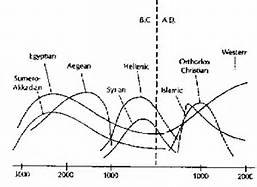 Rise and Fall of Civilizations
Rise and Fall of Civilizations
Not since Islam gulped down half of the Christian church the seventh and eighth centuries has the Christian church suffered such a numerical and geographical defeat as it has in its encounter with the modern-day world. The world we find ourselves in should be easy to classify in terms everyone can understand, and yet we are surrounded by people who will not let us use historical definitions. Examinations of where we are may lead us to the conclusion that we are finally encountering what Arnold Toynbee called the “worship of collective human power on a worldwide scale”.[1] There was a message of hope for this life in this collective. It seems that societies have assented to this message out of personal hope. If persuasion of personal hope doesn’t work fanaticism, use of force, technological subversion, and downright lying can do the trick. At the risk of sounding too political think of the fact that what was once the greatest nation on the face of the earth, voted twice for a community organizer who seemed to promise all things to all men. What we really see going on here is an angry demand for basic human satisfaction. It is been with us for hundreds of years. It is all around us today in the speeches we hear, the radio and television commercials we watch and it is an attempt to get us to believe “that that there are too many areas where unemployment undermines the right to work, where illiteracy inhabits the right to education, where poverty and squalor make mockery of the right to health, where conflict and violence undermine the enjoyment of human rights and fundamental freedoms.” It is said that Christianity, rather than being a cure to these ills, has been their handmaiden.
These issues are raised everyday in spite of years of welfare and a “war on poverty”. Those same issues faced the early church and they responded to it by acts if mercy. Their firm commitment to the Lord who loved them so much He died for them, made them willing to go out into the world and love others and be willing to die for them. Yet that faith is made fun of today, and in fact that faith is believed by some to be the source of all the problems.
[1] Arnold Toynbee, Christianity Among the Religions of the World New York Scrbners 1957 page 79

